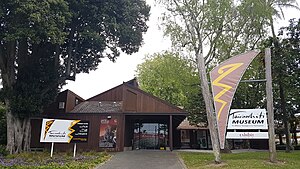Whataupoko
Whataupoko | |
|---|---|
 Tairāwhiti Museum | |
 | |
| Coordinates: 38°39′S 178°02′E / 38.650°S 178.033°E | |
| Country | New Zealand |
| City | Gisborne |
| Local authority | Gisborne District Council |
| Electoral ward | Tairāwhiti General Ward |
| Area | |
| • Land | 379 ha (937 acres) |
| Population (June 2024)[2] | |
• Total | 4,310 |
| Mangapapa | ||
| Te Hapara |
|
|
| Gisborne Central | Kaiti |
Whataupoko is the central residential suburb of the city of Gisborne in New Zealand. It is northeast of the Gisborne Central business district, across the Taruheru River, and north of the suburb of Kaiti, across the Waimata River. The suburb of Mangapapa is north-west of Whataupoko. Significant facilities are the headquarters of the Gisborne District Council and the regional museum, Tairāwhiti Museum,[3][4] both located near the southern point of Whataupoko at the confluence of the two rivers.
History and naming
[edit]The name Whataupoko derives from the Māori terms whata, meaning an elevated stage or platform, and upoko, meaning head. In about 1740, two warriors came to area to try to drive the local people out. The two attackers were captured and beheaded, and their heads (upoko) were hung from a rail on an elevated platform (whata), and so the name came about.[5]
Demographics
[edit]Whataupoko covers 3.79 km2 (1.46 sq mi)[1] and had an estimated population of 4,310 as of June 2024,[2] with a population density of 1,137 people per km2.
| Year | Pop. | ±% p.a. |
|---|---|---|
| 2006 | 3,708 | — |
| 2013 | 3,660 | −0.19% |
| 2018 | 3,864 | +1.09% |
| Source: [6] | ||
Before the 2023 census, the suburb had a smaller boundary, covering 3.65 km2 (1.41 sq mi).[1] Using that boundary, Whataupoko had a population of 3,864 at the 2018 New Zealand census, an increase of 204 people (5.6%) since the 2013 census, and an increase of 156 people (4.2%) since the 2006 census. There were 1,485 households, comprising 1,857 males and 2,001 females, giving a sex ratio of 0.93 males per female, with 819 people (21.2%) aged under 15 years, 609 (15.8%) aged 15 to 29, 1,719 (44.5%) aged 30 to 64, and 714 (18.5%) aged 65 or older.
Ethnicities were 81.4% European/Pākehā, 28.0% Māori, 2.3% Pacific peoples, 4.0% Asian, and 1.6% other ethnicities. People may identify with more than one ethnicity.
The percentage of people born overseas was 16.4, compared with 27.1% nationally.
Although some people chose not to answer the census's question about religious affiliation, 53.2% had no religion, 35.2% were Christian, 1.1% had Māori religious beliefs, 0.5% were Hindu, 0.1% were Muslim, 0.5% were Buddhist and 1.9% had other religions.
Of those at least 15 years old, 696 (22.9%) people had a bachelor's or higher degree, and 438 (14.4%) people had no formal qualifications. 564 people (18.5%) earned over $70,000 compared to 17.2% nationally. The employment status of those at least 15 was that 1,548 (50.8%) people were employed full-time, 519 (17.0%) were part-time, and 78 (2.6%) were unemployed.[6]
| Name | Area (km2) |
Population | Density (per km2) |
Households | Median age | Median income |
|---|---|---|---|---|---|---|
| Whataupoko East | 2.55 | 1,812 | 711 | 678 | 42.8 years | $38,600[7] |
| Whataupoko West | 1.10 | 2,052 | 1,865 | 807 | 41.4 years | $30,100[8] |
| New Zealand | 37.4 years | $31,800 |
Parks
[edit]The Whataupoko Reserve includes a dog walking area, and walking and mountain biking tracks.[9]
Waiteata Park has a picnic area and playground.[9]
There are also several local parks in the area which allow dogs on leashes: Ballance Street Reserve, Fox Street Reserve, Grant Road Reserve, Hall Street Reserve and Sheehan Street Reserve.[9]
Education
[edit]Gisborne Central School is a Year 1–6 co-educational state school[10] with a roll of 391 as of November 2024.[11][12][13] The school was founded in 1872.[14]
References
[edit]- ^ a b c "ArcGIS Web Application". statsnz.maps.arcgis.com. Retrieved 8 April 2024.
- ^ a b "Aotearoa Data Explorer". Statistics New Zealand. Retrieved 26 October 2024.
- ^ "Tairāwhiti Museum". Tairāwhiti Museum.
- ^ "Tairāwhiti Museum". Kōtuia. Te Papa Tongarewa.
- ^ Salmond, Anne; Phillips, Caroline. Te Awaroa: Restoring 1000 Rivers: Research Report 2: Waimata River (PDF). University of Auckland. pp. 4–5. Retrieved 24 August 2023.
- ^ a b "Statistical area 1 dataset for 2018 Census". Statistics New Zealand. March 2020. Whataupoko East (206600) and Whataupoko West (206700).
- ^ 2018 Census place summary: Whataupoko East
- ^ 2018 Census place summary: Whataupoko West
- ^ a b c "Gisborne Parks and Reserves". gdc.govt.nz. Gisborne District Council.
- ^ "Official School Website". gisbornecentral.school.nz.
- ^ "New Zealand Schools Directory". New Zealand Ministry of Education. Retrieved 1 January 2025.
- ^ "Ministry of Education School Profile". educationcounts.govt.nz. Ministry of Education.
- ^ "Education Review Office Report". ero.govt.nz. Education Review Office.
- ^ Marshall, Jack (19 December 2020). "Bell a-ringing at Central School". Gisborne Herald.
